17. The Thief of Bagdad (1940)
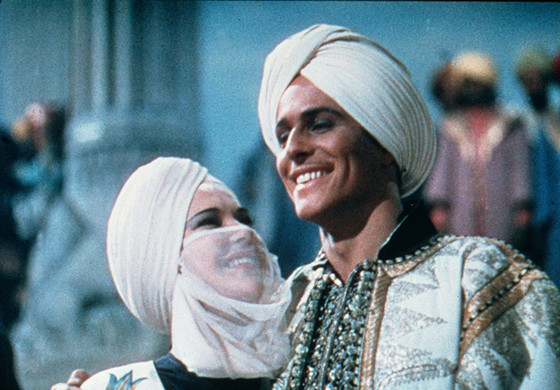
“This 1940 movie is one of the great entertainments. It lifts up the heart. An early Technicolor movie, it employs colors gladly and with boldness, using costumes to introduce a rainbow,” raved a breathless Roger Ebert in his famed Great Movies, adding that “[the story] in my mind moves from one spectacular special-effects sequence to another: the Sultan’s mechanical toy collection. The flying horse. The storm at sea. The goddess with six arms. The towering genie released from a bottle. Abu’s assault on the temple that contains the All-Seeing Eye. His climb up a mountainous statue. The battle with the gigantic spider. The flying carpet.”
Directed by a veritable army of talented filmmakers at the height of their considerable powers (Ludwig Berger, Michael Powell, and Tim Whelan with additional contributions from William Cameron Menzies, and brothers Vincent and Zoltán Korda), you’d think that this version of The Thief of Bagdad would be a convoluted case of too many cooks, but that’s not at all the case.
This beloved Arabian adventure, featuring a wonderful central performance from child actor Sabu as Abu, Conrad Veidt as the sinister Jaffar, and Rex Ingram as the Djinn, this is a wild ride of dazzling, magical misadventure. Don’t miss it.
16. The Dark Crystal (1982)
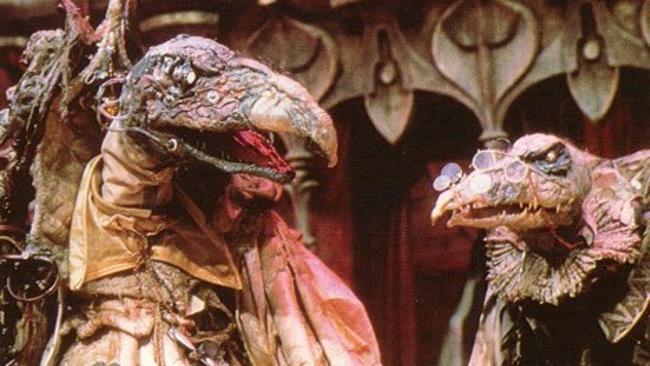
The 1980s bias joyously continues on this list with this inventive high fantasy adventure film from directors Jim Henson and Frank Oz. Representing a high water mark for all involved (including Brian Froud’s stunning creature, character, and landscape designs), the love, creativity, and devotion to their craft seems etched and oh so obvious in every meticulously assembled frame. I still remember holding my baby brother’s hand in the cinema lobby, tugging him towards the auditorium for choice seats, my heart thudding in excitement and anticipation. What revelry!
“Unlike many screen fantasies,” wrote Los Angeles Times critic Kevin Thomas, “the Dark Crystal casts its spell from its very first frames and proceeds so briskly that it’s over before you realize it. You’re left with the feeling that you have just awakened from a dream.”
The cosmology constructed by Henson, Oz, and screenwriter David Odell (who will also be scribing the forthcoming Netflix prequel series The Dark Crystal: Age of Resistance) may have a few similarities to Tolkien –– what epic-scale fantasy isn’t compared to the man behind Middle Earth? –– but this film is most assuredly its own beast.
Narrated by Joseph O’Conor, the film introduces Jen (Stephen Garlick), one of the remaining members of an elf-like race called Gelflings, raised by a noble race of wizards called the Mystics. Charged with the quest to find and recover a shard from the eponymous dark crystal, an all powerful and potentially deadly gemstone, currently being controlled by a cruel clan of birdlike baddies called Skeksis.
Joined by another Gelfling, Kira (Kathryn Mullen), and her enthusiastic dog-like critter Fizzgig (Dave Goelz), danger, redemption, and rescue awaits our unlikely heroes in this groundbreaking genre classic. A gem.
15. The Spirit of the Beehive (1973)
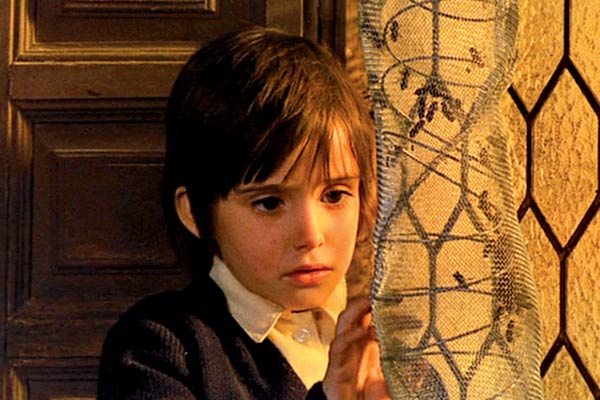
“Every magic hour, light-drenched image in Victor Erice’s The Spirit of the Beehive is filled with mysterious dread,” wrote Slant’s film critic Dan Callahan during the film’s plaudits-filled 2007 re-release.
The New York Times film critic A.O. Scott also added to the film’s praise suggesting that “the story that emerges from [Erice’s] lovely, lovingly considered images is at once lucid and enigmatic, poised between adult longing and childlike eagerness, sorrowful knowledge and startled innocence… [Erice’s] extraordinary film impossible to forget.”
Not only did The Spirit of the Beehive mark the directorial debut of Erice, his film is roundly regarded as a masterpiece of Spanish cinema.
Set in 1940, six-year-old Ana (Ana Torrent) is obsessed with the 1931 Universal Pictures film Frankenstein by James Whale. As we get to know Ana, her family life, her friends, and her schooling the film soon unfolds as a sharply realized allegory of life in the wake of Franco’s Spain as well as the Spanish Civil War.
A haunting fever dream of cinema, childhood, and the blurring of fantasy and reality, The Spirit of the Beehive is a haunting and hard to shake cinematic experience.
14. Edward Scissorhands (1990)
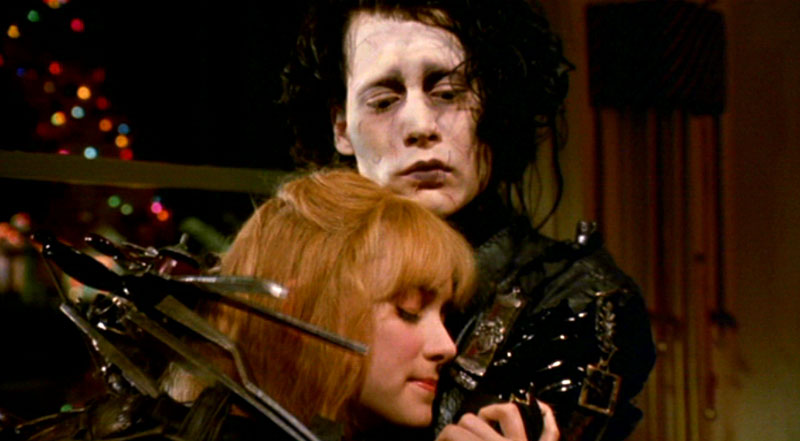
An eccentric pastel-hued world fit for fairytales, Edward Scissorhands was a decidedly deviant and bold follow up to Tim Burton’s mammoth blockbuster from the year before, Batman (1989), and continued a great chain of successes for the once great filmmaker––say it with me now: “What happened, Tim?!”
Johnny Depp delivers a quiet, emotive and gentle performance in the titular role––he only says 169 words throughout the film––as a creation from the antiquated inventor (Vincent Price). Edward is human looking in every way, save his hands, which are, yup, you guessed it, scissors.
Winona Ryder is Kim Boggs, a popular high school cheerleader who can’t help but be taken in by the delicate, messy haired muse. The two share more than a few sweet moments together but, in Beauty and the Beast fashion, their love is doomed. Teen angst and alienation is rarely shown on screen with this much style, subtlety, and eloquence. Unforgettable.
13. Willy Wonka and the Chocolate Factory (1971)
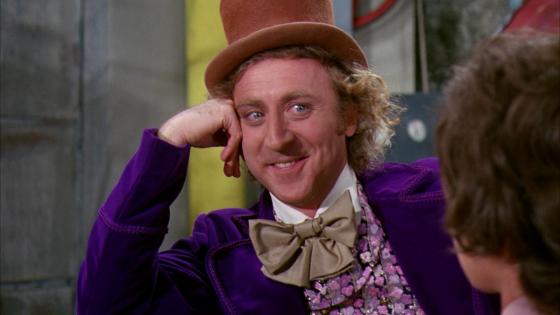
“If the good Lord had intended us to walk,” says Willy Wonka (Gene Wilder, brilliant), “he wouldn’t have invented roller skates.”
These sort of silly, pearl-on-a-string style non sequiturs and such populate director Mel Stuart’s wonderful and decidedly whacky 1971 film, Willy Wonka and the Chocolate Factory. Adapted with much artistic license and diversion from Roald Dahl’s 1964 novel “Charlie and the Chocolate Factory”, Stuart’s version is a singing, dancing musical mindfudge, and one that didn’t wash too well with Dahl (he didn’t hate it, but he didn’t option his sequel novel to Stuart, either, so there’s that).
And while the film ends entirely differently than the novel, the premise remains; one of five highly sought after golden tickets is discovered by Charlie Bucket (Peter Ostrum), a sweet, poverty-stricken boy. Now that Charlie has a coveted ticket, he and his Grandpa Joe (Jack Albertson, inspired) have earned admittance to the most WTF chocolate factory in the world, and an audience with the one and only Willy Wonka.
An absolute delight, with memorable and catchy music, an army of Oompa Loompas, lovable and loathable characters in aplomb (Julie Dawn Cole’s Veruca Salt is the ultimate iconic brat) and at least one nightmare fuelled detour through a scary tunnel (“Not a speck of light is showing, so the danger must be growing… Are the fires of Hell a-glowing?”), there’s really no other entertainment as fractured and fun as Willy Wonka and the Chocolate Factory (and no, Tim Burton’s version doesn’t hold a candle). To miss this film should be punishable by death (by chocolate, of course). Don’t miss it!
12. Orpheus (1950)
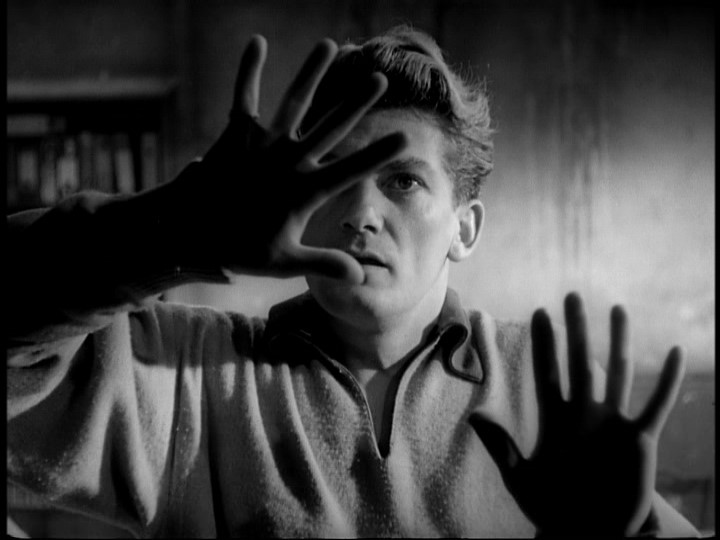
No list of the fantastic would be worth a lick if it didn’t contain the work of French writer, designer, playwright, artist and filmmaker Jean Cocteau (he’s on this list twice!). The centerpiece of Cocteau’s Orphic Trilogy (the other films being 1930’s The Blood of a Poet and 1960’s Testament of Orpheus), Orpheus reworks the ancient Greek myth in marvellous and mysterious ways.
Philip French of the Observer famously proclaimed the film “…a magical enduring classic, to be seen again and again,” and who are we to challenge such claims?
Opening in Paris at the Café des Poètes, a brawl busts loose between the titular poet Orphée (Jean Marais) and a group of belligerent drunks, including rival poet Cègeste (Edouard Dermithe).
The melee results in Cègeste’s tragic death and an enchanting and oddly alarming Princess (María Casares) takes the body and Orphée away in her regal Rolls Royce. To the underworld they travel, as the Princess reveals herself to be no less than Death, and Orphée must rescue Eurydice (Marie Déa) and flee the land of the dead.
“Seeing Orpheus today is like glimpsing a cinematic realm that has passed completely from the scene,” wrote Roger Ebert. “Films are rarely made for purely artistic reasons, experiments are discouraged, and stars as big as Marais are not cast in eccentric remakes of Greek myths. The story in Cocteau’s hands becomes unexpectedly complex; we see that it is not simply about love, death and jealousy, but also about how art can seduce the artist away from ordinary human concerns.”
11. Mary Poppins (1964)
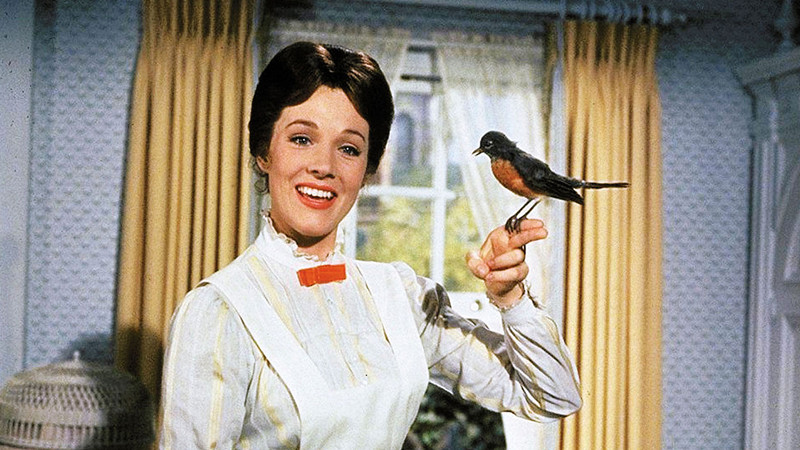
“Chim chiminey, chim chim cher-ee!”
Mary Poppins, the beloved musical-fantasy from director Robert Stevenson and producer Walt Disney, along with the enduring songs written and composed by the Sherman Brothers and Julie Andrews’s star turn as our titular magical lead, has made this film a affectionate favorite for generations of audiences.
Loosely adapted from P.L. Travers’s book series, this eye-popping blend of live-action and animation may gloss over some unsavory aspects of history (chimney-sweeping and forced child labor was never joyful for anyone), but, as TIME Magazine accurately assures us, “the sets are luxuriant, the songs lilting, the scenario witty but impeccably sentimental, and the supporting cast only a pinfeather short of perfection.”
Unfolding in Edwardian London, in the early 1900s, young Jane (Karen Dotrice) and Michael Banks (Matthew Garber) are the children of the rather wealthy but very uptight family who are put under the care of a new nanny, one Mary Poppins (Andrews). With their new (and magical) nanny in tow, the Banks kids embark on a series of adventures involving, amongst other things, the pronunciation of “Supercalifragilisticexpialidocious”, East End Cockney chimney sweep Bert (Dick Van Dyke), and much more.
If you ever desire to feel like a kid again, Mary Poppins is the perfect prescription.
10. Jason and the Argonauts (1963)
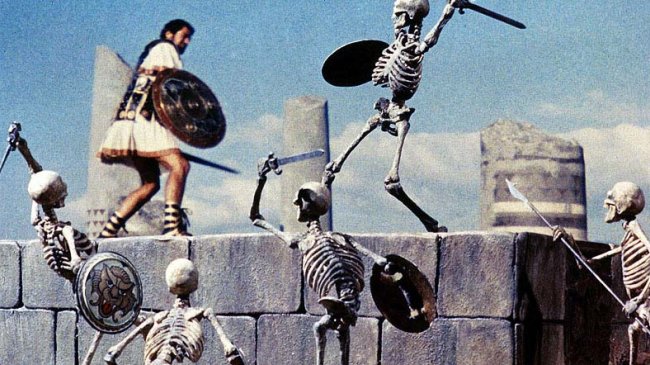
“Some people say Casablanca or Citizen Kane,” enthused Tom Hanks at the 1992 Academy Awards as he honored Ray Harryhausen with a lifetime-achievement award, ‘but I say Jason and the Argonauts is the greatest film ever made.”
Director Don Chaffey wisely collaborated with stop motion animation guru Harryhausen (who regarded Jason and the Argonauts as his best film) for this high water mark of fantasy adventure. The glorious battle sequence featuring skeleton warriors is worth the price of admission alone, but the film never lets up, moving from one set piece to another with alacrity and excitement to spare.
Jason (Todd Armstrong) saves Pelias (Douglas Wilmer) from drowning, not realizing he’s to blame for the death of his father King Aristo, when he was but a child. Before long Jason is questing for the fabled Golden Fleece, aided by the goddess Hera (Honor Blackman), Hercules (Nigel Green), and more, in this harrowing and hyperactive saga.
And if you need another reason to embrace this perennial favorite, the all-string score from regular Harryhausen collaborator Bernard Herrmann is a mythically-themed tour de force. For old-fashioned fun that still stirs the imagination, Jason and the Argonauts is top tier entertainment and always will be.
9. The Shape of Water (2017)
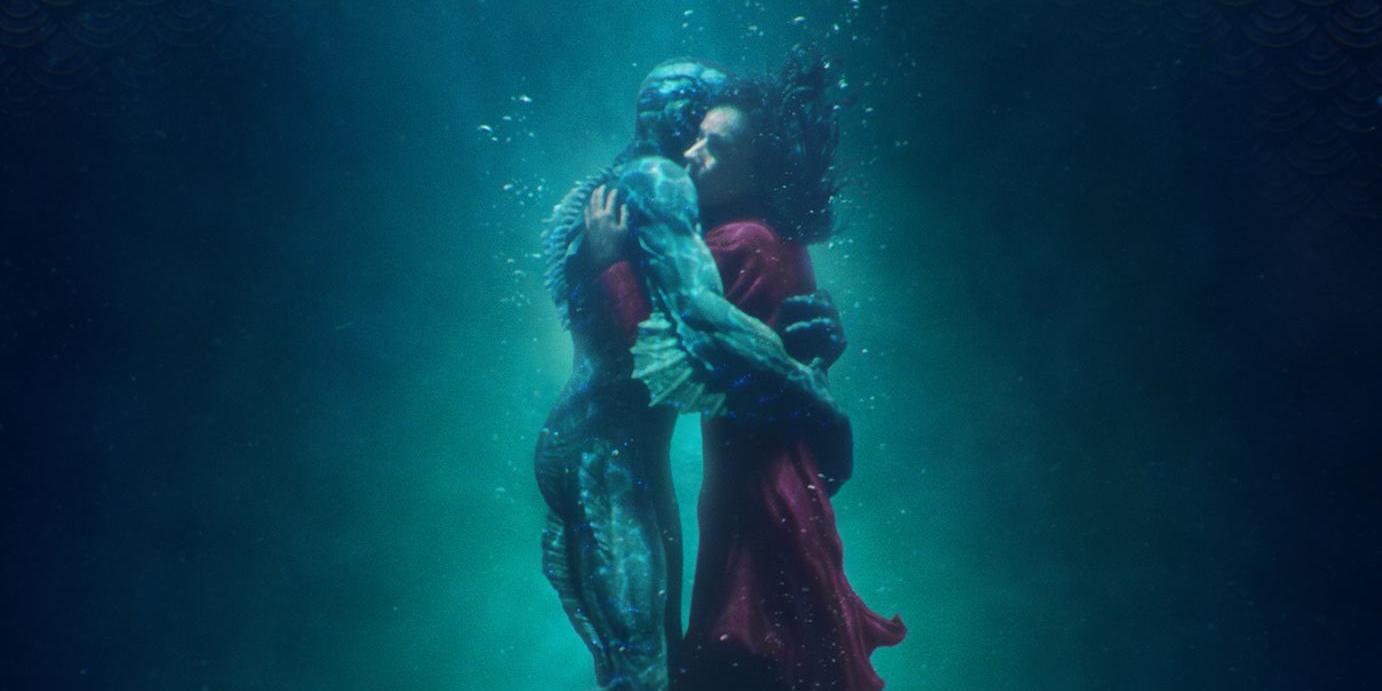
The newest film from marvellous Mexican filmmaker Guillermo del Toro (his wonderful 2006 dark fantasy classic Pan’s Labyrinth is also high atop this very list) may also be his greatest achievement to date, the fantastical pièce de résistance The Shape of Water.
Arriving in cinemas when it does, at a time of growing intolerance, much of del Toro’s film feels like it is very much a movie of it’s moment and time, and maybe this is largely because we need a movie that is this wonderfully romantic and this unusually lustful like we need an inoculation against the toxic news-cycle of the day and the easily upsetting parameters therein.
The Shape of Water, while set in 1962 Baltimore still strikes out as a romantic modern fairy tale (The Purple Rose of Cairo + La Belle et la Bête + The Creature from the Black Lagoon) that wisely knits the never-ceasing discrimination and disrespect minority groups face all across North America.
Buoyed with dignity, grace, and grievous heartbreak from the astounding Sally Hawkins (give this woman every acting award and distinction under the sun, please!), this movie will have you believe without batting a lash that a mute woman, Elisa Esposito (Hawkins) and a hard-boiled egg-devouring piscine amphibious humanoid (Doug Jones) from the uncharted depths of the Amazon can fall in love (and that you’ll root for them every unsteady step of the way).
With a perfect woozy score from Alexandre Desplat, expert lensing from cinematographer Dan Laustsen, dazzling production design from Paul Austerberry, and sensational special makeup effects by Jeff Derushie (and others), this empathetic, awe-inspiring ode to Old Hollywood and the heartstrings is del Toro’s generous gift to us all.